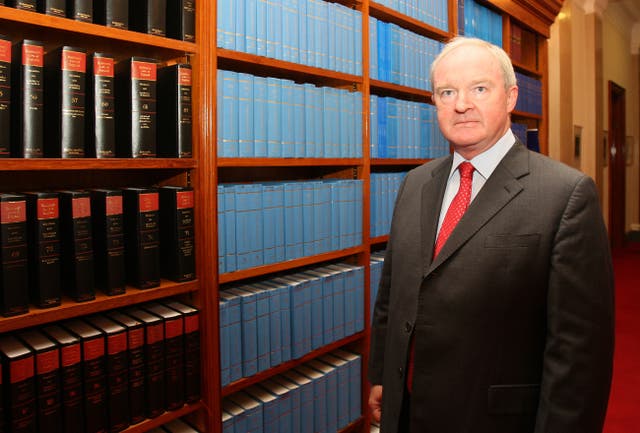
Former Stormont first minister Arlene Foster unlawfully mistakenly deferred a bid for extra funding for inquests into historic killings in Northern Ireland, a judge said.
She erroneously believed £150 million earmarked by the British Government as part of the 2014 Stormont House Agreement to speed up coroner’s hearings should await the outcome of an overall package dealing with all legacy issues, Belfast High Court judge Sir Paul Girvan added.
The state’s obligation to speedily investigate deaths during the conflict remained whether or not devolved Government was restored, he said.
He said: “She (Arlene Foster) was in error in concluding that it was legally proper to defer consideration of the funding issue because in the absence of an overall package the provision of additional funds to deal with the systemic delays in the legacy inquests would favour victims who were not innocent as against innocent victims of the Troubles.”
In 2014 the Government announced £150 million to support legacy reform in Northern Ireland, as part of a wider package of measures to address the legacy of the country’s toxic past.
Disagreement between Sinn Fein and the DUP over issues relating to the past meant that was not implemented.
In 2016 Northern Ireland’s Lord Chief Justice Sir Declan Morgan requested the cash be released to address a major backlog. A total of 54 inquests involving 94 deaths were covered.

Mrs Foster refused to table a government paper for agreement by the powersharing administration to petition the Northern Ireland Secretary for the funding, failing to discuss it with then deputy first minister Martin McGuinness, the judge said.
Unionists held concerns about a focus on state killings by police and Army personnel when most deaths were caused by paramilitaries.
The judge said more work was needed before the Treasury could have approved the proposal and cautioned unlimited public funds were not available.
Powersharing collapsed in Northern Ireland more than a year ago and the inquest issue has not been resolved.
Sir Paul said finding a resolution of the funding issue cannot be postponed until an outcome to a political agreement on other legacy issues.
“The longer the absence of a working devolved administration the longer the problem will continue and the greater it will become.”
The judge said the law did not envisage a lengthy hiatus.
“Undoubtedly a vacuum in which there are rudderless departments without ministers, the lack of a functioning Executive Committee and the absence of a sitting Assembly produces an essentially undemocratic system of unaccountable government provided effectively by senior civil servants who find themselves in an uncomfortable situation.”
Without resolution the UK faces yet again the “likelihood” of being found to be in breach of its Article 2 obligations to protect life and hold a speedy investigation into deaths, Sir Paul said.
Brigid Hughes took the judicial review. Her husband Anthony Hughes died in May 1987 when he was innocently caught in the cross-fire between soldiers and the IRA at Loughgall Royal Ulster Constabulary (RUC) station in Co Armagh.
Eight IRA men also died in the SAS ambush.
She said she was pleased with the outcome of the hearing but it had taken a long time.
Responding to the judgment, a UK Government spokeswoman said: “We need to take time to consider the judgment. Our thoughts today remain with all of the families in Northern Ireland who have lost loved ones as a result of the Troubles.
“The Secretary of State is very clear the current approach to addressing the legacy of the past is not working as it should. The UK Government is committed to working towards the full implementation of the 2014 Stormont House Agreement and the new bodies for addressing the legacy of the past.”


Comments: Our rules
We want our comments to be a lively and valuable part of our community - a place where readers can debate and engage with the most important local issues. The ability to comment on our stories is a privilege, not a right, however, and that privilege may be withdrawn if it is abused or misused.
Please report any comments that break our rules.
Read the rules here